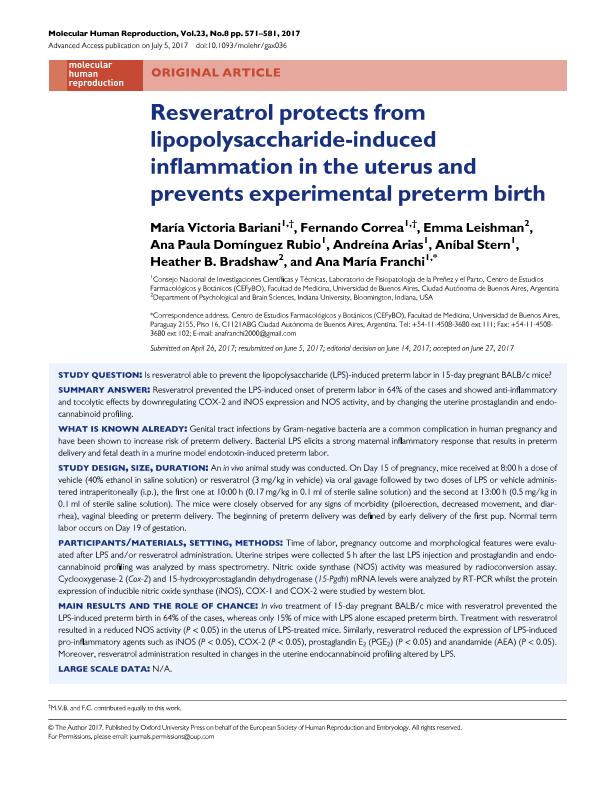Artículo
Resveratrol protects from lipopolysaccharide-induced inflammation in the uterus and prevents experimental preterm birth
Bariani, Maria Victoria ; Correa, Fernando Gabriel
; Correa, Fernando Gabriel ; Leishman, Emma; Domínguez Rubio, Ana Paula
; Leishman, Emma; Domínguez Rubio, Ana Paula ; Arias, Andreina; Stern, Anibal; Bradshaw, Heather B.; Franchi, Ana Maria
; Arias, Andreina; Stern, Anibal; Bradshaw, Heather B.; Franchi, Ana Maria
 ; Correa, Fernando Gabriel
; Correa, Fernando Gabriel ; Leishman, Emma; Domínguez Rubio, Ana Paula
; Leishman, Emma; Domínguez Rubio, Ana Paula ; Arias, Andreina; Stern, Anibal; Bradshaw, Heather B.; Franchi, Ana Maria
; Arias, Andreina; Stern, Anibal; Bradshaw, Heather B.; Franchi, Ana Maria
Fecha de publicación:
07/2017
Editorial:
Oxford University Press
Revista:
Molecular Human Reproduction
ISSN:
1360-9947
Idioma:
Inglés
Tipo de recurso:
Artículo publicado
Resumen
STUDY QUESTION: Is resveratrol able to prevent the lipopolysaccharide (LPS)-induced preterm labor in 15-day pregnant BALB/c mice? SUMMARY ANSWER: Resveratrol prevented the LPS-induced onset of preterm labor in 64% of the cases and showed anti-inflammatory and tocolytic effects by downregulating COX-2 and iNOS expression and NOS activity, and by changing the uterine prostaglandin and endocannabinoid profiling. WHAT IS KNOWN ALREADY: Genital tract infections by Gram-negative bacteria are a common complication in human pregnancy and have been shown to increase risk of preterm delivery. Bacterial LPS elicits a strong maternal inflammatory response that results in preterm delivery and fetal death in a murine model endotoxin-induced preterm labor. STUDY DESIGN, SIZE, DURATION: An in vivo animal study was conducted. On Day 15 of pregnancy, mice received at 8:00 h a dose of vehicle (40% ethanol in saline solution) or resveratrol (3 mg/kg in vehicle) via oral gavage followed by two doses of LPS or vehicle administered intraperitoneally (i.p.), the first one at 10:00 h (0.17 mg/kg in 0.1 ml of sterile saline solution) and the second at 13:00 h (0.5 mg/kg in 0.1 ml of sterile saline solution). The mice were closely observed for any signs of morbidity (piloerection, decreased movement, and diarrhea), vaginal bleeding or preterm delivery. The beginning of preterm delivery was defined by early delivery of the first pup. Normal term labor occurs on Day 19 of gestation. PARTICIPANTS/MATERIALS, SETTING, METHODS: Time of labor, pregnancy outcome and morphological features were evaluated after LPS and/or resveratrol administration. Uterine stripes were collected 5 h after the last LPS injection and prostaglandin and endocannabinoid profiling was analyzed by mass spectrometry. Nitric oxide synthase (NOS) activity was measured by radioconversion assay. Cyclooxygenase-2 (Cox-2) and 15-hydroxyprostaglandin dehydrogenase (15-Pgdh) mRNA levels were analyzed by RT-PCR whilst the protein expression of inducible nitric oxide synthase (iNOS), COX-1 and COX-2 were studied by western blot. MAIN RESULTS AND THE ROLE OF CHANCE: In vivo treatment of 15-day pregnant BALB/c mice with resveratrol prevented the LPS-induced preterm birth in 64% of the cases, whereas only 15% of mice with LPS alone escaped preterm birth. Treatment with resveratrol resulted in a reduced NOS activity (P < 0.05) in the uterus of LPS-treated mice. Similarly, resveratrol reduced the expression of LPS-induced pro-inflammatory agents such as iNOS (P < 0.05), COX-2 (P < 0.05), prostaglandin E2 (PGE2) (P < 0.05) and anandamide (AEA) (P < 0.05). Moreover, resveratrol administration resulted in changes in the uterine endocannabinoid profiling altered by LPS. LARGE SCALE DATA: N/A. LIMITATIONS, REASONS FOR CAUTION: Since our experimental design involves the use of mice, the extrapolation of the results presented here to humans is limited. WIDER IMPLICATIONS OF THE FINDINGS: Our findings provide evidence for the tocolytic effects of resveratrol. STUDY FUNDING AND COMPETING INTEREST(S): Dr Ana María Franchi was funded by Agencia Nacional para la Promoción Científica y Tecnológica (PICT 2013/0097) and by Consejo Nacional de Investigaciones Científicas y Técnicas (PIP 2012/0061). Dr Heather B. Bradshaw was funded by NIH (DA006668). The authors have no competing interests.
Palabras clave:
Endocannabinoid System
,
Lipidomics
,
Preterm Labor
,
Prostaglandin
,
Resveratrol
Archivos asociados
Licencia
Identificadores
Colecciones
Articulos(CEFYBO)
Articulos de CENTRO DE ESTUDIOS FARMACOLOGICOS Y BOTANICOS
Articulos de CENTRO DE ESTUDIOS FARMACOLOGICOS Y BOTANICOS
Articulos(IQUIBICEN)
Articulos de INSTITUTO DE QUIMICA BIOLOGICA DE LA FACULTAD DE CS. EXACTAS Y NATURALES
Articulos de INSTITUTO DE QUIMICA BIOLOGICA DE LA FACULTAD DE CS. EXACTAS Y NATURALES
Articulos(OCA PQUE. CENTENARIO)
Articulos de OFICINA DE COORDINACION ADMINISTRATIVA PQUE. CENTENARIO
Articulos de OFICINA DE COORDINACION ADMINISTRATIVA PQUE. CENTENARIO
Citación
Bariani, Maria Victoria; Correa, Fernando Gabriel; Leishman, Emma; Domínguez Rubio, Ana Paula; Arias, Andreina; et al.; Resveratrol protects from lipopolysaccharide-induced inflammation in the uterus and prevents experimental preterm birth; Oxford University Press; Molecular Human Reproduction; 23; 8; 7-2017; 571-581
Compartir
Altmétricas



